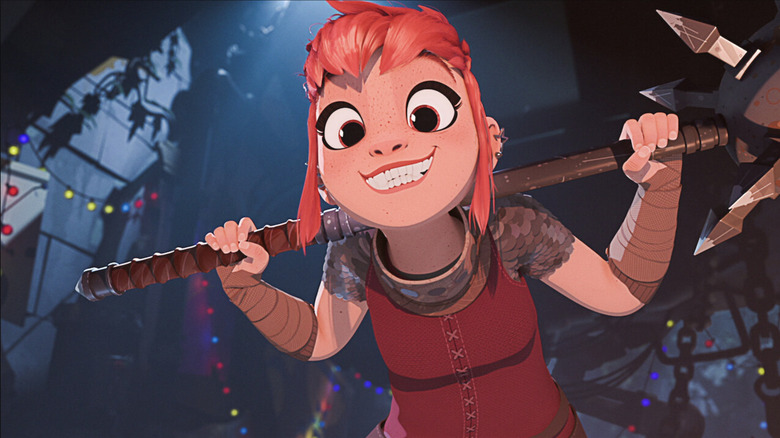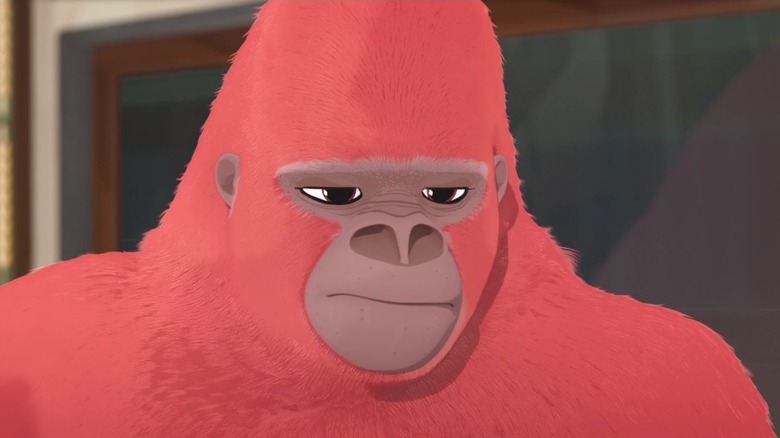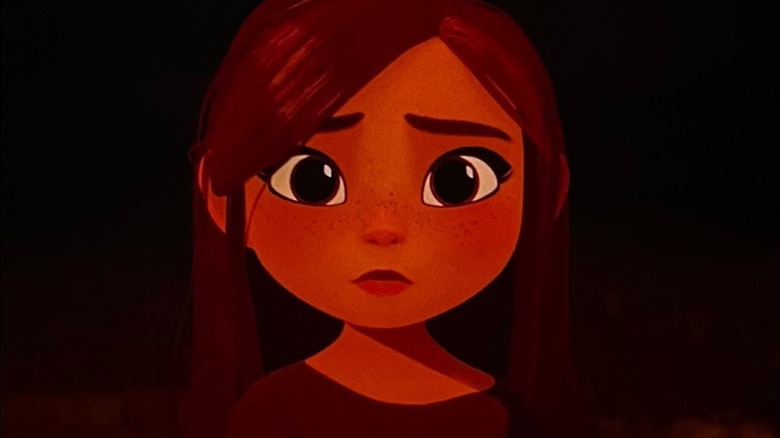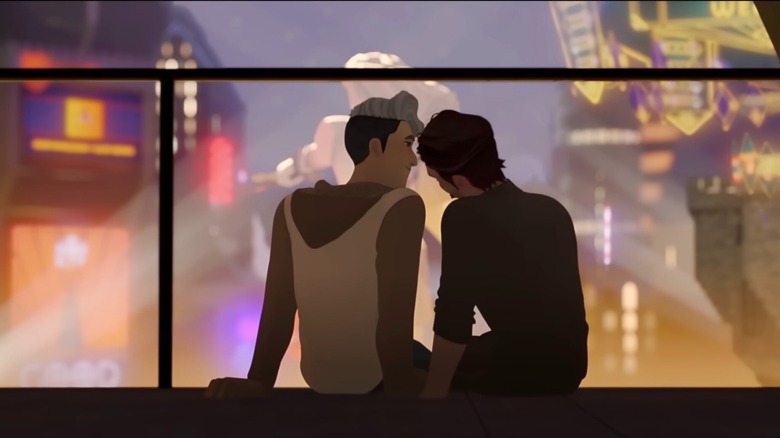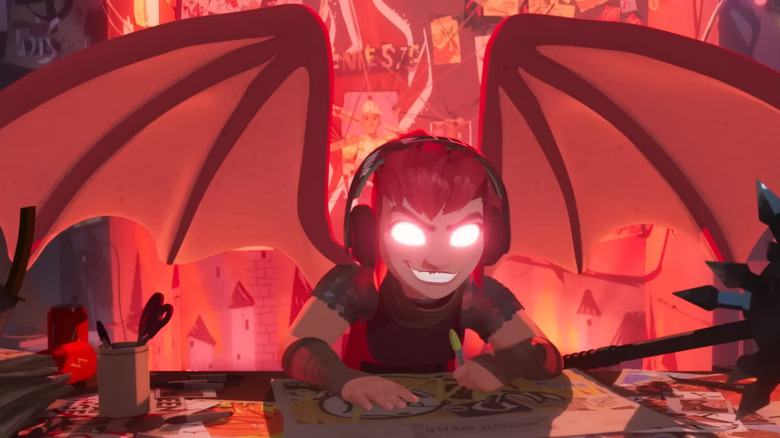Seeing Nimona With A Crowd Of Queer Kids Was One Of The Best Moviegoing Experiences Of My Life
(Welcome to Animation Celebration, a recurring feature where we explore the limitless possibilities of animation as a medium. In this edition: "Nimona.")
Following the Walt Disney Company's acquisition of Fox, Blue Sky Studios, the animation company behind films like "Ice Age," "The Peanuts Movie," and "Dr. Seuss' Horton Hears a Who!" was shuttered. This meant the already-in-progress adaptation of ND Stevenson's graphic novel, "Nimona," was canceled. It's a tragedy when any project is unceremoniously scrapped as what boils down to a corporate cost-saving measure but for a film like "Nimona," whose production was already fighting to be presented authentically as Disney attempted to stifle the overtly queer elements of the film, it felt like yet another example of a corporation devaluing the stories of an already marginalized community to appease the status quo.
Fortunately, a savior appeared in the form of Annapurna Pictures, who rescued the production, brought it to Netflix, and together made one of the best animated films of 2023. As a Netflix release, this means a majority of the viewers who fell in love with the story of a knight framed for murder trying to prove his innocence with the help of a shape-shifting teenager struggling to find a place in a retro-medieval futuristic kingdom did so from the comfort of their couch. "Nimona" is a phenomenal story that can resonate on screens of any size, but after catching a theatrical screening at Vidiots in Los Angeles surrounded by excited queer kids, queer adults watching the film they'd have given anything to watch as a kid and ally families, it was a communal experience that became so overwhelming that I'll openly admit to needing to step away and cry in the theater bathroom about it.
It's one thing to know a film is important, it's another thing entirely to experience that importance in real time.
Slaying the monster of societal pressures
"Nimona" is littered with queer metaphors and themes; like Nimona's shape-shifting powers as an allegory for gender fluidity or the association of society othering a character as "monstrous" drawing a parallel to the way LGBTQIA+ people are treated. However, it also features a canonical, textual gay relationship between Ballister Boldheart (Riz Ahmed) and Ambrosius Goldenloin (Eugene Lee Yang). But given that "Nimona" creator ND Stevenson is non-binary and transmasculine, there are also less obvious moments relating to the queer experience on screen that almost double like secret messaging from the creative team behind the film to the queer people watching at home to say, "We see you."
For instance, Ballister tells Nimona that things would be easier "if she just looked like a girl" instead of shapeshifting into animals all the time, even using the defense that not everyone is as accepting of Nimona's truth as he is. "Easier for who?" Nimona asks. It was during this moment that I could overhear parents whispering to their children things like, "And this is why we don't judge people by their appearances," and watching the gender-expansive audience members sigh deeply into their seats. It's a conversation a majority of queer people have had with their well-meaning loved ones, myself included, but also an inter-communal question often positioned by those who think assimilation is the key to liberation. (It isn't.)
Wouldn't it be easier if we were less "noticeably" queer? Wouldn't it be easier if we were just like everyone else? Nimona and Ballister both want vindication for the ways they've been mistreated but while Ballister is just looking for a society that will accept him as he is, Nimona is ready to break stuff and dismantle the system, brick by brick. Sure, Ballister's approach is easier, but to echo Nimona, easier for who?
Children are taught which monsters to fear
Nimona waffles between embracing the villainous label placed upon her for who she is and being so tired of feeling ostracized that there are days she thinks about just ending it all. "I don't know what's scarier, the fact everyone in this kingdom wants to drive a sword through my heart or that sometimes I just wanna let them," she confesses. Quite honestly, I don't think there's a queer person in my life who can't relate to this statement, myself included. But "Nimona" is unafraid to address the root of those fears, in that parents are often the ones who teach their children what to fear. When Nimona transforms into a giant version of a famous cereal mascot dragon, a small child looks on in awe as she shrinks down the form of a little girl ... before grabbing a sword and calling Nimona a "monster."
I've been Nimona. I've been pushed to the point where I want to kill myself or set the world on fire because it feels like there's no other option. (Don't worry, I'm in therapy.) I've written about what it felt like to do something as simple as go grocery shopping with my wife, and the dehumanizing sensation of seeing children smile at our brightly colored hair only for their parents to clock our queerness and physically pull them out of our paths, so this scene hit me particularly hard during my first viewing. But in the theater, hearing the smallest voice yell at the screen, "Nimona isn't a monster!" put a lump in my throat. The response of adults applauding and scattered replies from parents saying, "That's right! Nimona is NOT a monster!" was too much to bear.
I had to take refuge in the bathroom for a few minutes, crying out years of watching parents instill hateful beliefs into their children before my eyes to make room for the empathy of the families in that theater.
Movies build community
Before the "Nimona" screening, Vidiots Executive Director Maggie Mackay asked the crowd how many were seeing the film for the first time, and probably 50-60 hands shot up in the air, mostly parents and their children. When the film makes it known (in the first five minutes) that this is an unapologetically queer movie, I feared there would be a stampede of exits. But that didn't happen. Parents helped their children navigate story elements they didn't understand, emphasized why it's important to treat everyone with kindness, and the majority stayed afterward to hear a Q&A with Stevenson, director Troy Quane, producers Karen Ryan and Julie Zackary, star Eugene Lee Yang, and moderator Rebecca Sugar ("Steven Universe").
Discussions came up regarding book bans, "Don't Say Gay" bills, and the importance of telling stories that reflect our real and diverse world. Parents cheered and conversations flooded out into the lobby as children excitedly asked for autographs and talked about how "Nimona" was their new favorite movie. I loved "Nimona" when I first saw it on Netflix, but thanks to that theatrical experience, it will forever hold a place in my heart as one of the strongest reminders that there are still people in the world fighting for a better and more just society for vulnerable communities, even if they aren't directly a part of them.
Animation is not just for children, but the medium allows for accessible storytelling to a wider range of audiences. The initial experience of watching "Nimona" with other queer adults was a positive one, but it cannot hold a candle to the communal sharing of watching a movie with strangers and feeling united by the power of art and storytelling.
Streaming cannot replace the theatrical experience
As a movie lover who is also severely immunocompromised, streamers have been a lifeline now that our world is constantly threatened by the presence of COVID-19. Streaming has a vital place in our society as a tool of accessibility, but it would be unwise to say that watching movies at home can replicate the feeling of the theatrical experience. Now, more than ever, Netflix needs to make a permanent partnership with a movie theater chain to screen its films before they transition to life on the streaming platform. Fans were already pushing for extended theatrical runs following the success of "Glass Onion: A Knives Out Mystery," but Netflix consistently distributes incredible movies that were tailor-made for the communal viewing experience. Those who worked hard to bring the film to life obviously deserve the chance to see the finished product on the big screen, but people deserve the chance to laugh, cry, cheer, and experience art together. Roger Ebert famously stated that movies are like "a machine that generates empathy," and I was able to witness the empathy machine in action throughout "Nimona."
"If I could shapeshift, I'd turn into a kangaroo," a small girl told me in the lobby. I replied that I'd probably be a fruit bat because it's my favorite animal and I think flying would be fun, and she laughed, joking that she assumed I'd be a frog because I've got green hair. Her mother thanked me for "tolerating" her child's questions, and the two went home. It was a short exchange, taking up less than 30 seconds of my day, but helped alleviate years of pain weighing on my chest like a cinder block.
In that theater lobby, I wasn't worried about people confusing me for a monster because I knew they saw me for who I am ... and that's pretty metal.
